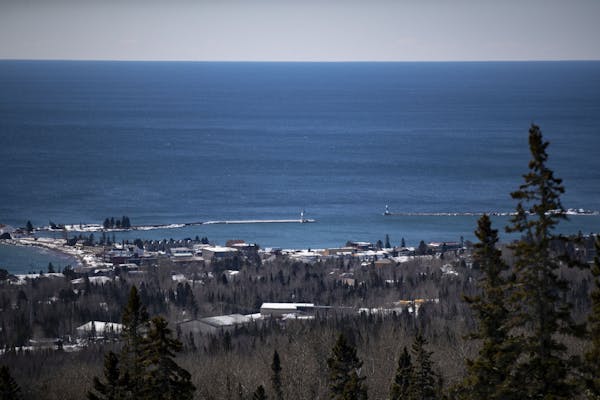CLEAR LAKE, WIS. – The way Mel Jacobson sees it, he's in the world's safest place right now.
"When the virus hit, it was pretty natural to come here," said the 85-year-old potter and teacher, who left his Minnetonka home 10 days ago for his 40 acres along the Hay River here, where he's reading, throwing pots and beginning work on his fourth book.
Jacobson made the roughly 80-mile drive northeast at the insistence of his family, who worried that his age, along with the hustle and bustle of the Twin Cities, made him an easy target for an invisible and potentially life-threatening virus.
"My daughter is a retired nurse," he said, "and she has been adamant that Grandpa is going to the farm. Period."
But it's a quarantine he doesn't mind, saying, "I'm doing my Zen thing. I'm here for the duration."
As the coronavirus pandemic spreads and social distancing becomes the norm, many urban residents are taking flight to their quieter digs in cabin country, hunkering down with books, board games and movies. While their presence may be unpopular with some year-round residents hoping to keep COVID-19 from spreading, the urban evacuees say it makes sense to hibernate.
"We just thought that rather than be in Edina where there are a lot of temptations to get this or that, we'd come here where it's very easy to isolate," said Barbara La Valleur, a retired photojournalist.
La Valleur and her husband have been at their farm on Muskrat Lake in Otter Tail County in west-central Minnesota for the past two weeks and plan to stay for two more.
With more than 120,000 cabins in Minnesota, and tens of thousands more in Wisconsin, there's no telling how many urbanites have already headed for the lake or woods.
But if Gov. Tim Walz has his way, there won't be many more. The governor issued a "stay at home" order last week that took effect Friday at midnight, and Walz hopes anyone thinking of making a dash to the cabin at this point will think again.
"Although the executive order doesn't prohibit traveling to or from a cabin, the governor strongly urges all Minnesotans to stay in their primary residences," Walz's office said in a statement. "Staying home helps protect your neighbors from spreading COVID-19 and also avoids crowding rural medical facilities. Avoiding this kind of travel makes us all safer and healthier."
Despite Walz's order, the rush north over the past week or two has been noticeable.
Grocery stores in the Brainerd Lakes Area reported record traffic last week, and merchants say it's not from locals stocking up.
Chuck Welte, owner of the Pine River Market, about 15 miles northwest of Nisswa, said the third week of March was busier this year than it had been for the same period in each of the eight years he's been owner.
"Our customer count was up by over 1,000 for the week compared to the year before," Welte said.
In neighboring Crosslake, Reed's Market has been "as busy as we are during the summer. It's crazy," said store employee Lynn Hart, adding, "I don't know why they don't stay home."
Putting out the stop sign
Indeed, the influx of seasonal residents escaping the heavily populated Twin Cities has led some summer destinations to put out the stop sign.
In Bayfield, Wis., a prime jumping-off point for the popular vacation spot of Madeline Island, the county health department last week strongly encouraged seasonal residents to stay home. Neighboring Ashland County did the same, as did Minnesota's Cook County, home of the Gunflint Trail.
Public officials said they were concerned that their rural health care systems could be overwhelmed by visitors possibly transmitting the virus.
Jill Craig said those concerns made her family decide to stay put in their Minneapolis home. They thought about going to their Barron County, Wis., cabin "instead of sitting here, getting on each other's nerves."
But, she said, she worried about possible backlash from local residents as well as whether the rudimentary tech connections at their cabin could withstand the traffic from two working adults and a college student and high schooler taking online classes.
Those who got to their cabins early, however, say there's little chance of spreading the virus in the isolated surroundings.
Duane Jacobson of Minneapolis has been holed up at his northeast Wisconsin cabin near Minocqua, Wis., for two weeks with his teenage son, Henry Coopmans, and their pet rabbit, Bert. His wife, Susan Coopmans, is a registered nurse at a Twin Cities senior living facility; she's still at her job, in lockdown.
Jacobson said he hasn't sensed much resentment from local residents during the few times he's left the cabin to run errands.
"There's no hint of, 'Why are you guys here?' " he said. "But there's not many people that had been up here when this all unfolded."
A chemical engineer, Jacobson is working remotely on international projects, cross-country skiing, playing board games and taking walks with his son. He said he relishes the time the two have been able to spend together in the woods.
"It kind of gives you an opportunity for a more detached viewpoint," he said. "Right now, everything going on is sort of surreal. It's a simpler lifestyle and it offers a lot of serenity. That's always very compelling, and now more so than ever."
John Reinan • 612-673-7402

Want to share info with the Star Tribune? How to do it securely

'Safe recovery sites' would offer syringes, naloxone and more to people using drugs. The plan could be in peril.
New Minnesota GOP leaders seek peace with party's anti-establishment wing

Who is Republican Lisa Demuth, Minnesota's first House speaker of color?

